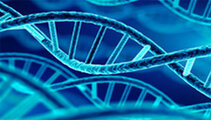Institute of Human Genetics
Diagnostics Laboratories

The main task of the Institute of Human Genetics is to elucidate the genetic basis of hereditary diseases. In our Diagnostics Laboratory for Cytogenetics and Molecular Genetics we offer a wide range of genetic tests.
In our Molecular Genetics Department we investigate disease specific sets of genes on the DNA level. Using Next Generation Sequencing (NGS) we analyze specifically designed gene panels to guarantee a fast and comprehensive genetic testing for the patient to achieve the highest possible percentage of cases that can be solved at comparatively low costs. We are using latest techniques for target enrichment and deliver highly reliable results by means of data evaluation by bioinformatics expertise as well as the usage of special software. The interpretation of detected variants is performed by a bioinformatician on the sequence level and by biologists on the gene or protein functional level. In addition we offer Sanger sequencing for specific requests.
To date we already offer gene panels for many different groups of diseases (see below). We are constantly expanding our diagnostics offer.
Some diseases are caused by chromosomal defects, which are analyzed in our Cytogenetics division. To this end we use classical cytogenetics methods or molecular cytogenetics analyses like array-CGH (comparative genomic hybridization) or FISH (fluorescence in situ hybridization).
Diagnostic Services of Hereditary Diseases - Molecular Genetics (NGS)
Hereditary tumor diseases (27 genes)
- Breast and ovarian cancer
- Colorectal carcinoma
Skin diseases (102 genes)
- Ichthyoses
- Hyperkeratoses, peeling skin syndrome and palmoplantar keratodermas
- Epidermolysis bullosa
Eye diseases (62 genes)
- Retinal diseases (retinopathies)
- Optic atrophies
- Corneal dystrophies
Vascular and connective tissue diseases (36 genes)
- Marfan syndrome
- Ehlers-Danlos syndrome
- Thoracic aortic diseases
Cardiovascular diseases (63 genes)
- Cardiomyopathies
- Arrhythmogenic diseases
Neurological diseases (38 genes)
- Dystonias
- Parkinson's disease
Dyslipidemias (35 genes)
- Hypercholesterolemia and hyperlipidemia
- Hypertriglyceridemia
Rheumatic diseases (69 genes)
- Periodic fever/autoinflammatory syndromes
- Interferonopathies
- Immunodeficiencies
Telemedicine Service
For hereditary skin diseases we offer telemedicine service for clinical co-assessment and support in the evaluation of the diagnosis.
Statistics
- Diagnostic offer: 500 genes
- Analyzed samples per year (blood, tissues, amniotic fluid): 1500
- NGS-samples per year: 300
Research
The research of our molecular genetics division (Prof. Dr. Dr. Judith Fischer) is focused the identification and functional characterization of genes associated with rare hereditary skin diseases (genodermatoses) such as ichthyoses and palmoplantar keratoderma. Prof. Fischer is an internationally recognized specialist on genetic skin disorders and has first identified a large number of genes for ichthyoses and related skin disorders (e. g. Heinz et al., 2017). Moreover the group is working on genetic factors of psoriasis which is a complex, multifactorial disease.

